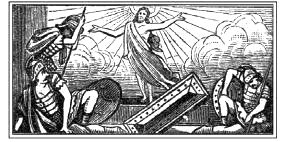
| Contents | Aurora lucis rutilat Light's Glittering Morn Bedecks the Sky |
Hymni |

This hymn is from the 4th or 5th century and is often ascribed to St. Ambrose (340-397). Whether it really is his or not, it is certainly worthy of his name. The complete hymn is composed of 44 lines and is given below. In the Liturgy it is broken up in multiple hymns. In the past it was broken into three hymns, Aurora lucis rutilat, Tristes erant Apostoli, and Claro Paschali gaudio, which were altered by Pope Urban VIII to Aurora caelum purpurat (Lauds), Tristes erant Apostoli (Vespers and Matins for Apostles and Evangelists in Eastertide), and Paschale mundo gaudium (Lauds for Apostles and Evangelists in Eastertide). Today parts of it are in the hymn for Laudes.
|
| AURORA lucis rutilat, caelum laudibus intonat, mundus exultans iubilat, gemens infernus ululat, |
LIGHT'S glittering morn bedecks the sky, heaven thunders forth its victor cry, the glad earth shouts its triumph high, and groaning hell makes wild reply: |
| Cum rex ille fortissimus, mortis confractis viribus, pede conculcans tartara solvit catena miseros ! |
While he, the King of glorious might, treads down death's strength in death's despite, and trampling hell by victor's right, brings forth his sleeping Saints to light. |
| Ille, qui clausus lapide custoditur sub milite, triumphans pompa nobile victor surgit de funere. |
Fast barred beneath the stone of late in watch and ward where soldiers wait, now shining in triumphant state, He rises Victor from death's gate. |
| Solutis iam gemitibus et inferni doloribus, <<Quia surrexit Dominus!>> resplendens clamat angelus. |
Hell's pains are loosed, and tears are fled; captivity is captive led; the Angel, crowned with light, hath said, 'The Lord is risen from the dead.' |
| TRISTES erant apostoli de nece sui Domini, quem poena mortis crudeli servi damnarant impii. |
THE APOSTLES' hearts were full of pain for their dear Lord so lately slain: that Lord his servants' wicked train with bitter scorn had dared arraign. |
| Sermone blando angelus praedixit mulieribus, <<In Galilaea Dominus videndus est quantocius>> |
With gentle voice the Angel gave the women tidings at the grave; 'Forthwith your Master shall ye see: He goes before to Galilee.' |
| Illae dum pergunt concite apostolis hoc dicere, videntes eum vivere osculant pedes Domini. |
And while with fear and joy they pressed to tell these tidings to the rest, their Lord, their living Lord, they meet, and see his form, and kiss his feet. |
| Quo agnito discipuli in Galilaeam propere pergunt videre faciem desideratam Domini. |
The Eleven, when they hear, with speed to Galilee forthwith proceed: that there they may behold once more the Lord's dear face, as oft before. |
| CLARO PASCHALI gaudio sol mundo nitet radio, cum Christum iam apostoli visu cernunt corporeo. |
IN THIS our bright and Paschal day the sun shines out with purer ray, when Christ, to earthly sight made plain, the glad Apostles see again. |
| Ostensa sibi vulnera in Christi carne fulgida, resurrexisse Dominum voce fatentur publica. |
The wounds, the riven wounds he shows in that his flesh with light that glows, in loud accord both far and nigh ihe Lord's arising testify. |
| Rex Christe clementissime, tu corda nostra posside, ut tibi laudes debitas reddamus omni tempore! |
O Christ, the King who lovest to bless, do thou our hearts and souls possess; to thee our praise that we may pay, to whom our laud is due for aye. |
| Translation by J. M. Neale (1818-1866). |
<- Prev |
Next-> |
